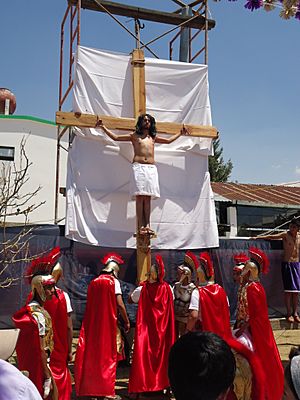Passion play facts for kids

A Passion play is a special kind of play that tells the story of Christ's suffering, death, and coming back to life. These plays started a long time ago, in the Middle Ages. They are religious dramas that show important events from the Bible.
At first, these plays were in Latin and were part of church services. They included readings from the Bible and poems about Jesus's life. They also featured stories about people like Mary Magdalene and events like the Last Supper.
Over time, people started adding parts in their own languages, not just Latin. This led to new, independent plays. The first ones we know of were in German. These plays often began with scenes from the Old Testament, like the story of Adam and Eve. They sometimes even included characters like Satan.
Contents
History of Passion Plays
Early European Plays
In different parts of Europe, Passion plays developed in unique ways. For example, plays in Cornwall and Brittany (parts of the UK and France) became very long. They told stories from the beginning of time up to the Last Judgment.
In the Tirol region, plays focused mainly on Jesus's suffering and resurrection. Plays in Bohemia also had their own special style and stories. These differences show how local traditions shaped the plays.
French and Flemish Plays
In France and Flanders, Passion plays grew from a 13th-century poem. These plays became very detailed and long. Some performances lasted for more than a week! Groups called "confraternities" were formed just to put on these plays. The most famous was the Confrérie de la Passion, started in 1402. Passion plays were also popular in Spain, Italy, and other countries.
Changes Over Time
By the 1500s, some Passion plays started to change. They became more like popular entertainment, with jokes and silly parts. Because of this, many churches and leaders began to ban them. After the Reformation, even more plays were stopped.
The Oberammergau Passion Play
A Famous Tradition
The most famous Passion play that still happens today is in Oberammergau, a village in the Bavarian Alps, Germany. This play has a long and special history. According to tradition, the villagers promised to perform the play every 10 years. They made this promise in 1634 after being saved from a terrible plague.
The play has been performed almost every decade since then. It was only stopped during the Franco-Prussian War in 1870 and World War II.
Local Production and Modern Era
The Oberammergau play is truly a local event. All the actors and singers are villagers from Oberammergau. The performances run from May through September. Since 1930, the audience sits under a roof, protected from the weather.
In recent times, there have been discussions about the play's text. Some people, including Jewish organizations, have pointed out that parts of the 1860 script had anti-Semitic ideas. Efforts have been made to update the text to remove these parts.
Other Modern Passion Plays
Passion plays are still performed in other places too. In the Austrian Tirol, traditional plays have been brought back to life. In northern Spain, villagers perform a Catalan Passion play during Lent and Holy Week. In Tegelen, Netherlands, a modern play is performed every five years.
Images for kids
-
Crucifixion scene during the 2010 production of the musical The Promise: The Power of His Love in Fond du Lac, WI









